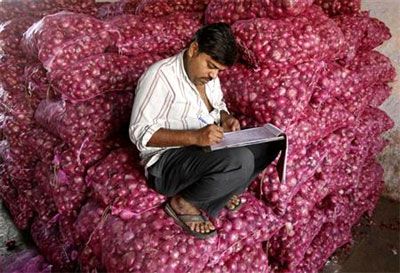
At Rs 5 a kg in Lasalgaon mandi, the price is 10% lower than average cost of production
Onion prices fell to the lowest level of this season at Rs 5 a kg, also the lowest in nearly two years, in the benchmark Lasalgaon mandi in Nashik on Monday, owing to a massive upsurge in arrivals of the new season crop.
Despite closure of business in the market yard on Monday because of a public holiday, farmers brought 65 tonnes of onion to sell outside the Agricultural Produce Market Committee yard at a price between Rs 4 and Rs 5 a kg.
Amid fear of quality deterioration, farmers preferred to dump at any price quoted by buyers.
The average cost of production is Rs 5.50 a kg.
“We have no choice but to sell at any price.
The red onion produced in the late kharif season cannot be stored for long-term use due to shorter shelf life.
In the earlier season, when prices started moving up, the government assured us help during the harvesting season.
Now, there is no support from the government.
"We borrowed from a local money lender, to whom the repayment looks impossible,” said Pundalke Panchpute, a farmer in Lasalgaon with three acres.
Sanjay Sanap, proprietor of Shivkrupa Traders, an onion trader in Nashik, said: “When prices move up, all make a hue and cry.
"But, no one comes to farmers’ rescue when the price slumps to below production cost.
"Onion farmers face this every year.”
At present, onions arriving in different markets of the country are the produce of the late kharif season, primarily form Maharashtra, Gujarat and Madhya Pradesh.
The quality is good and the per-unit output is expected to be higher than in the previous years.
The National Horticultural Research and Development Foundation forecasts output to be higher by five-seven per cent at 20.5-20.8 million tonnes this year, compared to 18.93 mt in the previous season.
It estimates sowing at 1.2-1.3 million hectares, against 1.17 million hectares last year.
“As anticipated earlier, a huge quantity of kharif and late kharif season crop arrival is hitting the mandi. Prices are likely to remain subdued and might decline further on bumper supply,” said RP Gupta, director, NHRDF.
In a major relief for traders, a large quantity of import orders have started flowing into India from Sri Lanka, West Asia etc.
Interestingly, Chinese buyers remained absent from the market due to the New Year holiday there.
Once they resume trade by the end of this week, shipment to China and Malaysia would also begin.
Currently, India executes export orders to the tune of 100,000-125,000 tonnes a month. Once China and Malaysia markets start procuring onion from India, the overall exports would shot up to 150,000-175,000 tonnes a month.
“But, expectations of an upsurge in exports might not lower prices in domestic markets until supply is controlled. Since export-quality onion is quoted at Rs 6-7 a kg, a fall of another Rs one per kg is possible,” said Ajit Shah, president, Horticulture Exporters Association.
This would, however, translate into the medium quality of onion falling further to Rs 4 a kg and below in the coming weeks.
India exports around 1.5 mt of onion every year.
Last year, however, the country had to import around 25,000 tonnes of onion to rein in spiralling onion prices.
The image is used for representational purpose only. Photograph: Reuters











